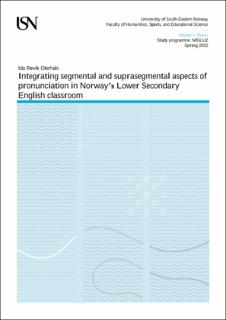| dc.description.abstract | This research study investigates pronunciation teaching among English teachers at Norwegian lower secondary schools. The study aims to find out how much English teachers integrate pronunciation into their teaching, with reference to both segmental and suprasegmental aspects. This is linked to the informants’ formal higher education in the English subject, their competence and knowledge about pronunciation and their ability to provide an English model for their pupils. Furthermore, the teachers’ teaching methods and the different ways they work with pronunciation will be investigated. The final aspect that will be included in this study concerns the different varieties of the English language and what the teachers consider a good English pronunciation.
The data were collected using the mixed methods approach, through a quantitative questionnaire and a qualitative interview. Four secondary English teachers took part in the study, and the topics covered in the interviews included their own educational background and competence, teaching methods and challenges and thoughts about pronunciation teaching. Previous research suggests that pronunciation teaching should be implemented systematically and explicitly, and that teachers should be aware of their competence in the subject matter and of their role as pronunciation models in the English classroom.
The results show that pronunciation is rarely integrated into the English classroom. Even though the teachers are confident about their competence and English skills, they do not implement pronunciation systematically or explicitly in their teaching. However, the teachers’ type and recentness of education do seem to make a difference. Their actual competence appears to boost their ability to teach pronunciation spontaneously and integrate it with other language aspects. In addition, the teachers tend to introduce different varieties of the English language, but they all agreed that there is no pressure to aim after a native accent and stressed that it is more important to have an intelligible pronunciation. | |
